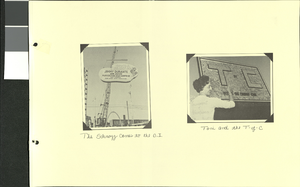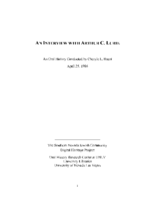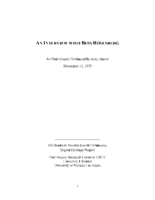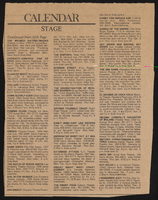Search the Special Collections and Archives Portal
Search Results

Photographs of Anti-Defamation League Nevada Region Office events, Las Vegas (Nev.), 2007-2012
Date
Archival Collection
Description
Speakers and attendees at events held by the Anti-Defamation League Nevada Region Office in Las Vegas, Nevada.
Image

Desert Inn Country Club family album, Las Vegas (Nev.), November 07, 1981
Date
Archival Collection
Description
Album celebrating the 25th anniversary of the Desert Inn Country Club in Las Vegas, Nevada.
Mixed Content
Mack, Joyce, 1925-2024
Joyce Mack was a community leader, volunteer, and philanthropist in Las Vegas, Nevada who supported UNLV since its founding. Born Joyce Rosenberg on August 17, 1925 in Los Angeles, California, she later attended the University of California, Los Angeles, where she met her husband Jerome D. "Jerry" Mack. The couple married in 1946 and moved to Las Vegas, Nevada in 1947.
Person

Transcript of interview with Marie Horseley by Suzanne Becker, June 13, 2007
Date
Archival Collection
Description
Twenty years after her birth in Utah in 1924, Marie Horseley met and married her husband who was an engineer for the Union Pacific Railroad. They settled in Las Vegas, his home town and soon purchased a home for $9800 in the new John S. Park neighborhood. Sixty years later Marie, twice a widow, remains in the home. Up the street four doors, one of her granddaughters lives with her three children. Marie recalls the new housing development that appealed to railroad workers. The roads were dirt and there were no streetlights, but soon a community blossomed. Marie is a self-described quiet resident; her life was about raising her three daughters and being a member of the LDS church. However, she knew everyone on her street no matter their religious affiliation. Today the businesses are gone. Homes have changed appearances over the years as owners have changed. Ethnic diversity is apparent and the sense of community closeness has slipped away for her. Yet she loves her place there, feels safe and secure. When asked about the ides of John S. Park being designated a historic district, she is not all that wowed by the idea of restrictions that might be included in that. Nevertheless, she has no intention of relocating from the comfort of the place she has called home all these years.
Text

Transcript of interview with Arthur "Art" Lurie by Cheryle Bacot, April 25, 1986
Date
Archival Collection
Description
Interview with Arthur "Art" Lurie by Cheryle Bacot on April 25, 1986. Lurie talks about his family and upbringing with Kenny Washington, who was the first African American to sign with the National Football League. Lurie discusses knowing everybody in Las Vegas in the 1950s, being in the service/retail sector and watching the city grow. He operated several businesses including grocery stores and the liquor department at Wonder World. He talks about his love of boxing, serving on the boxing commission, and advantages of living in southern Nevada.
Arthur C. Lurie lived in Las Vegas for 33 years at the time of this 1986 oral history. He and his wife Eleanor had relocated from Los Angeles area to help run his brother-in-law's food market. Over the years his career would include the grocery, bar (Art's Place) and restaurant businesses; including being co-owner of the liquor store at Wonder World. He shares memories of adjusting to the more laid back culture of small town Las Vegas and how he feels like a native after watching the city grow over the past decades. Art was a founding member of Temple Beth Sholom, where he served as an early vice-president. Being in the non-gaming sector provided gave him the opportunity to work with youth programs and he started the Golden Gloves gym in Las Vegas. He judged over 40 title fights and had a long career on the Nevada Boxing Commission. Arthur Lurie past away in 2014 at the age of 96.
Text

Transcript of interview with Bess Rosenberg by Jerry Masini, November 12, 1975
Date
Archival Collection
Description
Interview with Bess Rosenberg by Jerry Masini on November 12, 1975. In this interview, Rosenberg describes coming to Las Vegas in 1942, and the desert landscape. She gives an in-depth recollection of the first atomic test, and talks about different weather and the seasons in Las Vegas. Rosenberg describes several clubs and hotels around downtown and the recreation at Lake Mead and Mount Charleston.
Text

Transcript of interview with Ronald "Ron" Lurie by Stefani Evans and Claytee D. White, October 17, 2016 and November 10, 2016
Date
Archival Collection
Description
Ron Lurie is a product of Las Vegas. Ron Lurie knows Las Vegas. The Los Angeles native arrived in Las Vegas with his parents when he was twelve years old; his father opened Market Town next to White Cross Drug Store. Lurie graduated from Las Vegas High School in 1958 and attended Nevada Southern, where he played baseball and basketball before joining the United States Army Reserves. Returning from training, he began working at a new store, Fantastic Fair. Soon the owner, builder Lloyd Whaley, asked him to manage a new Fantastic Fair. At 24 years of age, he managed the entire Fantastic Fair store, which later became Wonder World. Over time, Lurie would manage three of the four Wonder World stores. In this interview, the former mayor of the City of Las Vegas and former Las Vegas City Council member talks about running for City council because he wanted more parks and ball fields downtown and about his political career, which coincided with the years of explosive growth in the 1970s and 1980s. The current vice president and general manager of Arizona Charlie's also v discusses his careers in the grocery business and in gaming; he speaks to giving back to the community and the changing demography of the area surrounding Arizona Charlie's; he talks of the ways Steve Wynn pioneered an aura of glamour that helped to upgrade Downtown Las Vegas; he recalls the challenges of public safety, regional transportation, flood control, and the Monorail and of civic dreams of a magnetic levitation train that would connect Downtown Las Vegas to Cashman Field. He remembers his parents and his wife; he talks about his children, and he shares vignettes of, among many others, Ernie Becker IV, Bill Briare, Al Levy, Steve Miller, and Bob Stupak. Throughout, Mayor Lurie especially beams when he talks about his family, his friends, his work, Las Vegas, the Boys and Girls Clubs, and baseball. This man loves baseball.
Text


